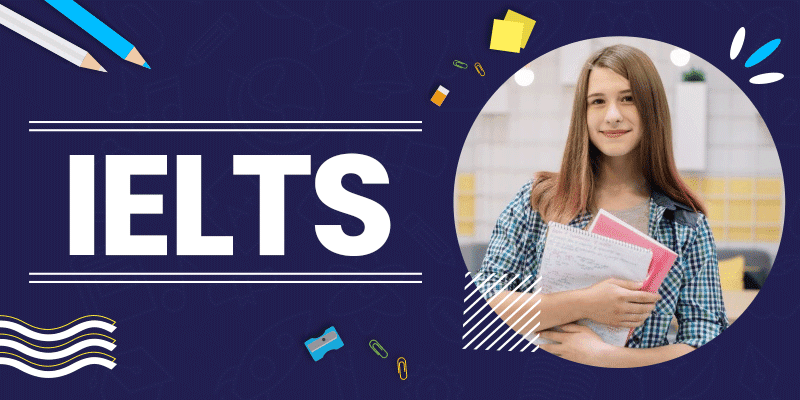
The IELTS score is globally acknowledged as a standard for assessing English language proficiency, widely required for higher education across numerous countries such as the USA, the United Kingdom, Australia, Canada, and New Zealand. Achieving a band score of 9.0 is the highest possible, with many universities accepting scores of 6.0 for undergraduate admission and 6.5-7.0 for graduate admission. The IELTS test has two versions
Available packages for IELTS
Regular
- 3.5 months
- 3 days/week
- 30 classes
- 20 Mock Tests
Crash
- 1.5 months
- 4 days/week
- 15 classes
- 10 Mock Tests
Hybrid
- 6-7 months
- Combination of 3 courses: Spoken English + Grammar-Writing + Regular IELTS
You have the option to repeat our course until you achieve your desired score, and there will be no additional charges for doing so. (TMC applied)
Exam Structure
Section 1
Listening
- 4 parts
- 30 minutes
Section 2
Reading
- 3 passages
- 60 minutes
Section 3
Writing
- 2 tasks
- 60 minutes
Section 4
Speaking
- Interview
- 10-15 minutes
- Enhancing their knowledge and awareness of the IELTS test.
- Gaining familiarity with the structure of the IELTS test.
- Acquiring various test-taking techniques and strategies.
- Engaging in practice sessions and receiving constructive feedback on individual test components.
- Developing a clearer understanding of their strengths and weaknesses in the four language skills.
- Cultivating specific subskills, such as skimming and scanning in the reading paper, and using cohesive devices in the writing paper, to enhance performance in each exam paper.
- Improving proficiency in language systems, including English tenses, conditionals, relative clauses, and affixation.
- Recognizing their proficiency level in speaking, reading, listening, and writing.
- Identifying and overcoming challenges encountered in the IELTS.
- Demonstrating the ability to write various academic essay types.
- Evaluating and self-correcting their speaking skills.
- Preparing for the logistics of the IELTS examination, including time management, order of sections, and format.
- Interpreting and describing statistical data using appropriate language and grammar.
- Demonstrating an enhanced vocabulary in both writing and speaking.
- Formulating, expressing, and defending opinions using appropriate vocabulary.
- Exhibiting improved listening skills for comprehension and details.
Our instructional approach in this course will align with the teaching styles employed by the British Council and Cambridge assessments. Commencing with foundational concepts, we will administer one or two mock tests to gauge the students' proficiency. The results of these mock tests will serve as a roadmap, guiding us on how best to support and instruct the students. Thus, our journey with the students will be shaped by these insights.
Class 1: Welcome and course orientation.
Class 2: Assessment test to gauge students' current language proficiency and identifying areas for improvement & Sample question solution provided by British Council. Determining target band score and discussing specific needs.
Class 3: Basic Listening, correcting pronunciation, Advanced Phonetics for IELTS speaking, Practicing listening
Class 4: Grammar for IELTS- discussing advanced use of preposition, articles, tense, phrasal verbs and sentence completion.
Class 5: Introduction to IELTS Writing Task 1(Graphs, Charts, and Tables) - Discussing about the structure, tips & tricks. Practice writing tasks with feedback and peer review
Class 6: Introduction to IELTS Writing Task 2- Outlining the structure of essay writing and discussing about the tips, tricks & strategies. Practice writing tasks with feedback and peer review
Class 7: In-depth instruction & focusing on IELTS Reading strategies, group analysis and discussion.
Class 8: Practicing Reading Comprehension. (Cambridge book)
Class 9-12: Practicing Reading Comprehension with feedback
Class 13-18: Practicing Writing Task with feedback
Class 19-20: Practicing Listening Task with feedback
Class 21-23: Practicing Speaking with feedback
Class 24-26: Reading Comprehension with feedback
Class 27-29: Practicing Writing Task 1 & 2 with feedback & peer review.
Class 30: Full-length IELTS practice test (Listening, Reading, Writing, Speaking).
Class 31: Detailed analysis and feedback on practice test performance.
Class 32: Additional practice tests with timed conditions.
Class 33: Review of common mistakes and strategies for improvement.
Class 34: Final full-length practice test.
Class 35: Mock IELTS test (Listening, Reading, Writing, Speaking).
Class 36: In-depth review and analysis of mock test results
Writing
Initiating the IELTS examination, the writing segment, which serves as the inaugural section, entails the composition of concise essays or reports. This component comprises two tasks. Initially, candidates are tasked with crafting a 150-word essay by scrutinizing and comprehending graphical representations, diagrams, data, and tables. Subsequently, aspirants are required to generate an essay in their own words, centered on a given perspective, idea, or argument.
- IELTS Academic Writing: Tailored for those pursuing postgraduate or undergraduate degrees, the IELTS Academic syllabus delves into general interest topics. The first task entails interpreting and elucidating diagrams, data, or graphical representations in a 150-word essay. The second task involves drafting a 250-word essay based on provided data, presenting a coherent viewpoint or argument with relevant examples, adhering to a formal and structured writing style.
- IELTS General Training Writing: This module comprises two tasks of a slightly lower difficulty level than the Academic module. The first task involves composing a formal or semi-formal letter based on a given situation, while the subsequent task requires writing an essay, with the tone being semi-personal or personal.
- Question Types in Writing Section:
- Agree/disagree
- Advantages/disadvantages
- Cause/solution
- Two-part questions
- Discuss both sides of a question
Reading
The IELTS reading module, designed for undergraduate and postgraduate degree students, consists of 40 questions related to general interest topics. Question types include short questions, multiple-choice questions, matching phrases, and data lists. The reading examination differs between Academic and General Training modules.
- IELTS Academic Reading: Similar to the Academic writing section, the Academic reading section explores general interest topics. The question formats include short-answer questions, matching information, identifying writer’s views/claims, sentence completion, and more.
- IELTS General Training Reading: Tailored for a slightly easier level, the General Training reading module involves questions related to everyday situations. Question types mirror those of the Academic module.
Question Types in Reading Section:
- Multiple Choice Questions
- Short-answer questions
- Matching information
- Matching headings
- Matching features
- Identifying information
- Identifying writer’s views/claims
- Sentence completion
- Matching Sentence Endings
- Diagram label completion
- Summary, note, table, flow-chart completion
Listening
The listening section's syllabus remains consistent across both Academic and General Training modules. Students listen to four recordings and answer 40 questions, covering social, environmental, and educational scenarios.
Question Types in Listening Section:
- Multiple Choice Questions
- Sentence completion
- Matching
- Plan, map and diagram labelling
- Table, flow- chart, summary completion
Speaking: Concluding the IELTS examination, the speaking section follows a uniform pattern for both Academic and General Training modules. It assesses candidates' speaking skills through personal interviews, discussions, and brief speeches.
Question Types in Speaking Section:
Part 1 – General topics, self-introduction, background, hobbies, and educational qualifications.
Part 2 – Speech on a given topic, followed by a question and answer session.
Part 3 – In-depth discussion on serious issues and abstract topics.
IELTS serves as a crucial examination for candidates aspiring to pursue education in renowned countries. A comprehensive understanding of the exam pattern, types, and question formats is essential for effective preparation.


